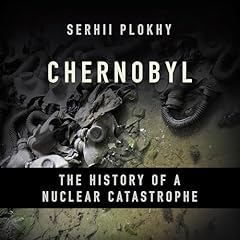
The Chernobyl Disaster: The History and Legacy of the World's Worst Nuclear Meltdown
No se pudo agregar al carrito
Add to Cart failed.
Error al Agregar a Lista de Deseos.
Error al eliminar de la lista de deseos.
Error al añadir a tu biblioteca
Error al seguir el podcast
Error al dejar de seguir el podcast
 Exclusivo para miembros Prime: ¿Nuevo en Audible? Obtén 2 audiolibros gratis con tu prueba.
Exclusivo para miembros Prime: ¿Nuevo en Audible? Obtén 2 audiolibros gratis con tu prueba.Compra ahora por $9.76
-
Narrado por:
-
Dennis E. Morris
Includes accounts from workers and residents
Includes a bibliography for further reading
"The risk projections suggest that by now Chernobyl may have caused about 1,000 cases of thyroid cancer and 4,000 cases of other cancers in Europe, representing about 0.01 percent of all incident cancers since the accident. Models predict that by 2065 about 16,000 cases of thyroid cancer and 25,000 cases of other cancers may be expected due to radiation from the accident, whereas several hundred million cancer cases are expected from other causes." (Findings in an article published in the International Journal of Cancer in 2006)
Uranium is best known for the destructive power of the atom bombs, which ushered in the nuclear era at the end of World War II, but given the effectiveness of nuclear power, nuclear power plants were constructed around the developed world during the second half of the 20th century. While nuclear power plants were previously not an option and thus opened the door to new, more efficient, and more affordable forms of energy for domestic consumption, the use of nuclear energy understandably unnerved people living during the Cold War and amid ongoing nuclear detonations. After all, the damage wrought on Hiroshima and Nagasaki made clear to everyone what nuclear energy was capable of inflicting, and the health problems encountered by people exposed to the radiation also demonstrated the horrific side effects that could come with the use of nuclear weapons or the inability to harness the technology properly.
The first major accident at a nuclear power plant took place at Three Mile Island in Pennsylvania in 1979, which took nearly 15 years and $1 billion to fully clean up, but Three Mile Island paled in comparison to Chernobyl, which to this day remains the most notorious nuclear accident in history.
©2012 Charles River Editors (P)2015 Charles River EditorsLos oyentes también disfrutaron:




















ho-dem-chuck
fo-mean
so many mispronounced names. I can't take it seriously with a southern drawl.
who picked this reader for this book? lol
Se ha producido un error. Vuelve a intentarlo dentro de unos minutos.
Accurate but short overview of the Chernobyl disaster
Se ha producido un error. Vuelve a intentarlo dentro de unos minutos.
Interesting Story.
Se ha producido un error. Vuelve a intentarlo dentro de unos minutos.
What is peculiar is having someone perform the narration with a southern drawl and butchering every name beyond recognition. Example: Sergei sound almost like sergeant. Not to mention how he pronounces the arguably weird names of government bureaucracies, such as “Soyuzelektromontazh”. You’d think you could get someone who’d put in perhaps a little effort to pronounce Russian names correctly, given this happened in the USSR.
Almost comical
Se ha producido un error. Vuelve a intentarlo dentro de unos minutos.
Stay away from this awful “book”
Se ha producido un error. Vuelve a intentarlo dentro de unos minutos.


